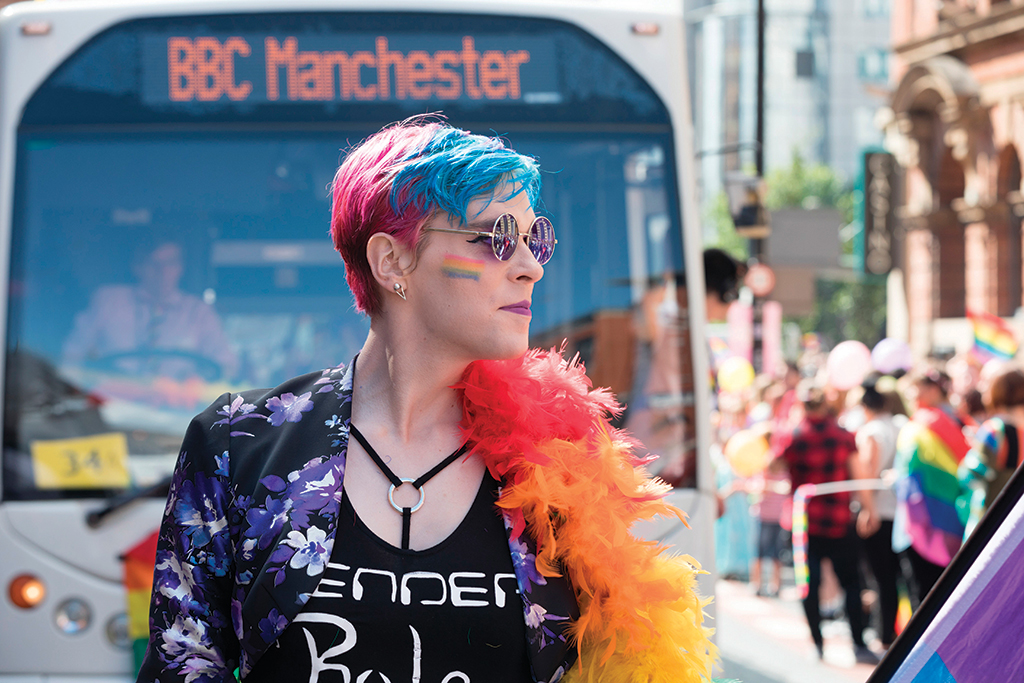Speaking at the weekend’s traditional closing event, a Monday night vigil for those lost to AIDS, Mayor Burnham and others pointedly connected the fight for LGBT rights and the destigmatization of HIV to a more global embrace of personal and cultural differences.
On a moonlit Monday night last August, Mayor Andrew Burnham stood before an earnest crowd in Manchester, England’s Gay Village and offered this apology: “I’m sorry you had to watch me Dad-dancing to ‘YMCA’ earlier.”
Burnham was among the thousands of other straight Mancunians who’d joined in with the local LGBT community as enthusiastic participants in the annual three-day Manchester Pride celebration (www.manchesterpride.com).
The city’s festivities, one of the UK’s largest Pride events, took on added resonance last year, coming just three months after the deadly terrorist attack at an Ariana Grande concert there. Over the course of an unusually sunny bank holiday weekend, locals and thousands of visitors flooded the city with bright colors, joyful noise, and a sense of not just gay pride, but unified civic pride.
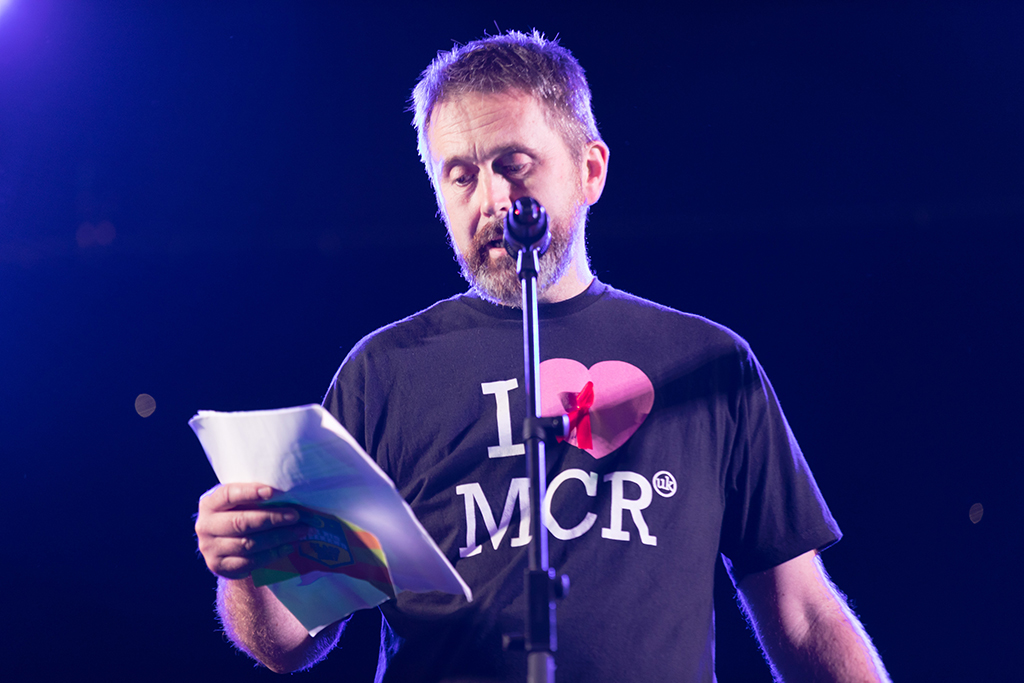
Stuart Murray
Large numbers of straight couples and children were unmissable in the cheering crowds along Peter Street in the city center for a lively Saturday afternoon parade. On the heads of both marchers and onlookers one could spot plenty of the bunny ears, sometimes sported by singer Grande, which have become a symbol of local solidarity.
Even miles from the Gay Village, the windows of pubs and shops were festooned with twinned symbols: rainbow flags alongside the city’s traditional worker-bee emblem (The bee has long stood for Manchester’s industriousness and collaborative spirit).
Speaking at the weekend’s traditional closing event, a Monday night vigil for those lost to AIDS, Mayor Burnham and others pointedly connected the fight for LGBT rights and the destigmatization of HIV to a more global embrace of personal and cultural differences.
“This is my first Manchester Pride,” said a visibly emotional Stuart Murray, the stepfather of Martyn Hett, a 29-year-old gay man who was among those killed at the concert attack. Hett’s large circle of LGBT friends were among those who provided an outpouring of sympathy and support to his family in the wake of the tragedy.
Acknowledging a painful irony, Murray told the assembled crowd that “…my uncle died of HIV more than 20 years ago, I remember that his illness and death were little spoken of, almost as if we were ashamed.”
Murray went on to describe extremist terrorism and homophobia as “cowardly evil in various guises.”
“I want to thank Manchester Pride for doing proud by Manchester,” said Mayor Burnham, who was elected just three weeks prior to the arena bombing. “…we will never let the forces of hate change the way that we live.”
Manchester has long been moved by the persistent forces of social activism, including the struggle for LGBT rights. It was here that, in 1954, codebreaking WWII hero Alan Turing committed suicide after being criminally convicted for homosexual acts and subjected to aversion therapy.
But less than a decade later, in 1962, Manchester was home to the initial organization of the UK’s Campaign for Homosexual Equality (CHE). By 1967, CHE had helped drive national decriminalization of gay sex, and the organization continues to fight for LGBT rights today.
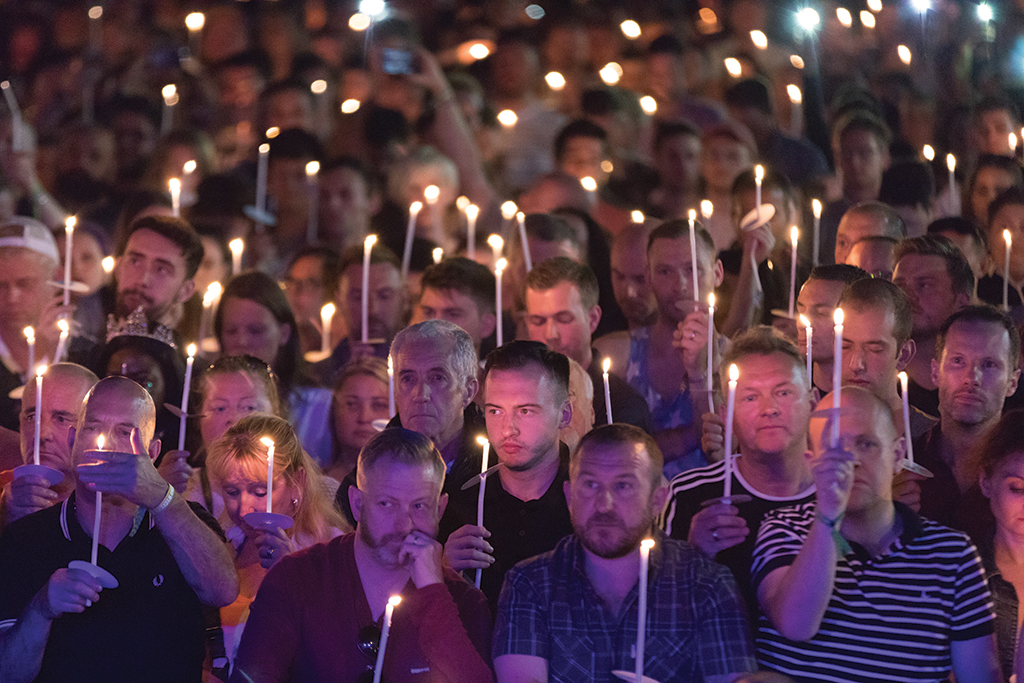

Manchester Pride Candlelight Vigil
A monument to Turing and the site of the CHE’s first meeting are among 18 locations that comprise the city’s Out in the Past Trail, and they are marked with sidewalk mosaics that resemble rainbow flags. The trail, created in 2003 with funds provided by the British national lottery, also includes the sites of the city’s first known gay bar; the offices of 19th-century gay activist Edward Carpenter; and the venue for an 1880 drag ball that was raided by the police, generating notoriety for Manchester as a hub of the UK’s gay community.
Tours of the sites are occasionally offered by the Manchester Pride organization (www.outinthepast.org.uk) and can also be arranged to fit visitors’ schedules by outstanding local guide Jonathan Schofield (www.jonathanschofieldtours.com).
Like the city’s pride parade, the Out in the Past sites are not confined to the Gay Village area, where most of Manchester’s more than 30 gay bars and night clubs are located. Instead, these markers can be found throughout the city center, their colorful tiles reminding gay tourists that they are welcome here, while persistently punctuating the consciousness of the local population, gay and straight.
International consciousness of Manchester as a destination for LGBT travelers got an invaluable boost from the groundbreaking 1999-2000 British television series Queer as Folk. Beyond its indelibly electrifying scene of Stuart (Aidan Gillen, lately of Game of Thrones) analingually pleasuring teenage Nathan (Charlie Hunnam, now best known for his roles in Sons of Anarchy and the movie—ahem—Pacific Rim), Queer as Folk show-cased the canal-side Gay Village as a convivial, community-centric neighborhood.
The LGBT appeal of the Village, and of Manchester as a whole, was solidified in 2003, when the city hosted Europride. Today, Manchester-based Thomas Cook Airlines offers direct flights between Manchester International Airport and many popular gay holiday destinations in the US, including New York, San Francisco, and Miami.
Landing in Manchester on the eve of last summer’s Pride weekend, a flight attendant announced over the PA system that Thomas Cook was proud to sponsor the city’s festivities and invited all passengers to attend the parade and watch “for myself and other members of our team.”
While many American airlines generously support LGBT charities and have a presence at community events, Thomas Cook’s open, upbeat presentation of its sponsorship to a general audience was truly impressive. It was also very much in keeping with Manchester’s civic elevation of Pride into a celebration to be enjoyed by its entire population.
The city has a long history at the forefront of human rights movements. Manchester was the seat of the British women’s suffrage campaign, now permanently honored in exhibitions at The Pankhurst Centre (www.thepankhurstcentre.org.uk). And while Manchester’s economy was once fueled by its cotton mills, it was local citizens who led the UK’s abolition movement, pushing for the end of slavery not just in the British empire but in the United States as well. Travelers may be surprised to come across a monumental statue of Abraham Lincoln in the city center. A gift from the US in 1919, its plaque acknowledges “the support that the working people of Manchester gave…supporting the Union at a time when there was an economic blockade of the southern states…which caused considerable unemployment.”
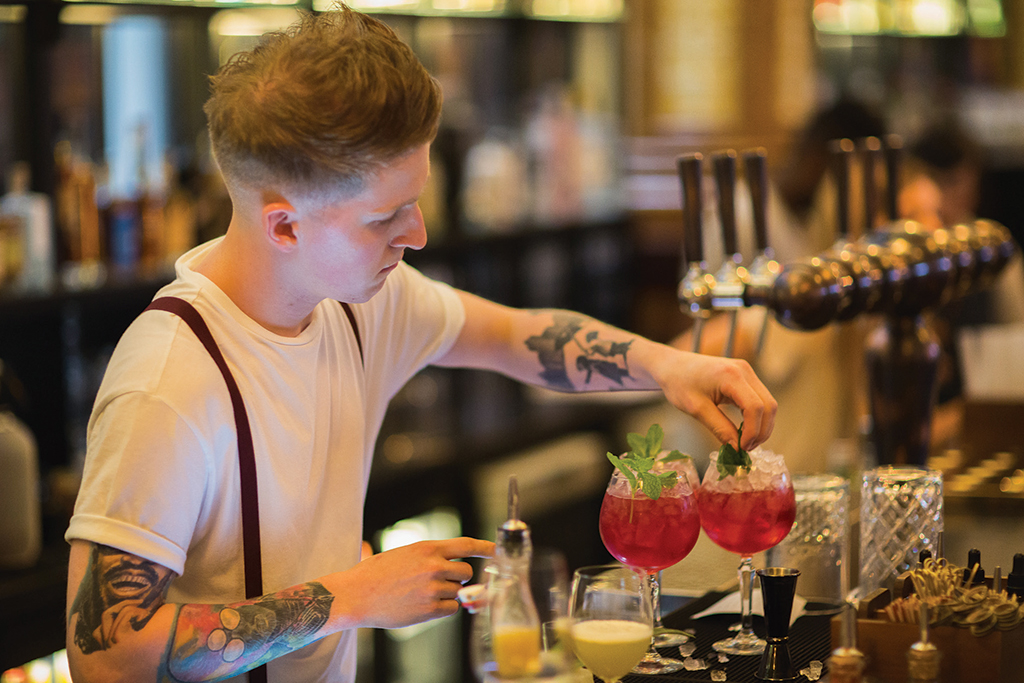

The Refuge
Today, in addition to Pride, Manchester plays host to Britain’s annual Sparkle Weekend (www.sparkle.org.uk), a national transgender gathering that encompasses exhibitions, lectures, films and parties each July.
While Pride and Sparkle offer LGBT travelers special incentive to visit Manchester, the city has much to offer throughout the year.
As the center of gay nightlife for all of Northern England, the Village teems with life every weekend, regularly drawing from the Lake District, Liverpool, Leeds, and beyond. Londoners seeking an easy weekend escape can get to Manchester by train in a relaxing two hours. (It can take three to four hours by car.)
From the Hunnam wannabes at dance clubs like Bar Pop and G-A-Y Manchester to the drag and cabaret shows at Centre Stage and VIA; and from the lesbian scene at Vanilla to in-your-face peen at The Eagle or BASE sauna, the Village’s nine densely packed blocks form one of the world’s most concentrated queer playgrounds (www.canalst.co.uk).
One of Manchester’s best nightlife options beyond the Village is HomoElectric, an approximately monthly Saturday dance party held in enormous venues with multiple DJs and dance floors.
Billed as catering to “homos, heteros, lesbos, and don’t knows,” these sweaty, unpretentious all-nighters feature eclectic international spinners and a thrillingly unpredictable mix of disco, rock, techno, and house music. (Protip: It can get hot as hell at these shindigs, so bring a hand fan that will keep you cool, and make you scads of adorable short-term friends.)
At the forefront of the Manchester’s acclaimed contemporary arts offerings is HOME (www.homemcr.org), a sleek glassfronted performance and exhibition complex opened just three years ago. A five-screen state-of-the-art film center offers a smartly curated schedule of documentaries, international titles, and independent productions, while live programing features cutting-edge local theater, dance, and music along with works cherry-picked from the West End and the Edinburgh Fringe Festival.
Since 2005, the city has hosted the biennial Manchester International Festival (www.mif.co.uk), which takes over traditional performance venues as well as cathedrals, pubs, and parking lots across town for a kaleidoscopic array of live arts events over two weeks in July. Past festivals have included the debut of Bjork’s Biophilia extravaganza, a collaboration between Jamie XX and visual artist Olaffur Eliasson, and a concert by Massive Attack accompanying new work by filmmaker Adam Curtis in a formerly abandoned train depot.
The city’s heritage of liberalism and forward-thinking social movements is paid due tribute to at the People’s History Museum (www.phm.org.uk). Subjects including LGBT life, labor unions, women’s rights, and political cartooning are regularly showcased.
Also worth visiting for a glimpse into Manchester’s history as a center of innovation is the Museum of Science and Industry (www.msimanchester.org.uk). Among the city’s contributions to the world are the passenger railway, the submarine, atomic theory, and the programmable computer.
Eminently walkable, Manchester is an open-air museum of architecture, with stunning examples of Victorian, neo-Gothic, and art nouveau intermingling throughout a low-rise city center. A network of arching railroad viaducts dating back to the 19th century creates a lovely rhythm as one strolls through town. Unlike London, there are few buildings here over four stories tall, so the sky is ever present, bringing a calmer sensibility to England’s second-largest metropolis.
Two major historic buildings have been converted into first-rate, centrally located hotels. The entryway and public areas of the Radisson Blu Edwardian Hotel & Spa are housed in the former Free Trade Hall, a storied music venue originally opened in 1856 and restored after major WWII bombing damage. Leonard Bernstein once conducted the resident orchestra here and Bob Dylan played a controversial early electric show in 1966. The hotel’s first floor Opus One bar, with its wide covered portico along Peter St. hosts an annual Pride parade viewing party.
Simultaneously grand and hip, The Principal Manchester (www.phcompany.com/principal/manchester-hotel) is a stunning interior renovation of Refuge Assurance Company’s one-time national headquarters. Plush first-class rooms are accessed through a skylightdomed marble lobby, which also opens onto The Refuge by Volta (www.refuge.mcr.co.uk) a sprawling, multi-chambered public gathering spot that incorporates a bar, a café, an interior garden, outdoor patio, and a not-to-be-missed restaurant.
The dinner menu features stunningly composed small plates with international flair. Highlights include a salad of crisp-skinned duck surprisingly paired with watermelon and pomegranate molasses; crisp arancini stuffed with meltingly braised short rib; and spiced lamb flatbread sprinkled with mint.
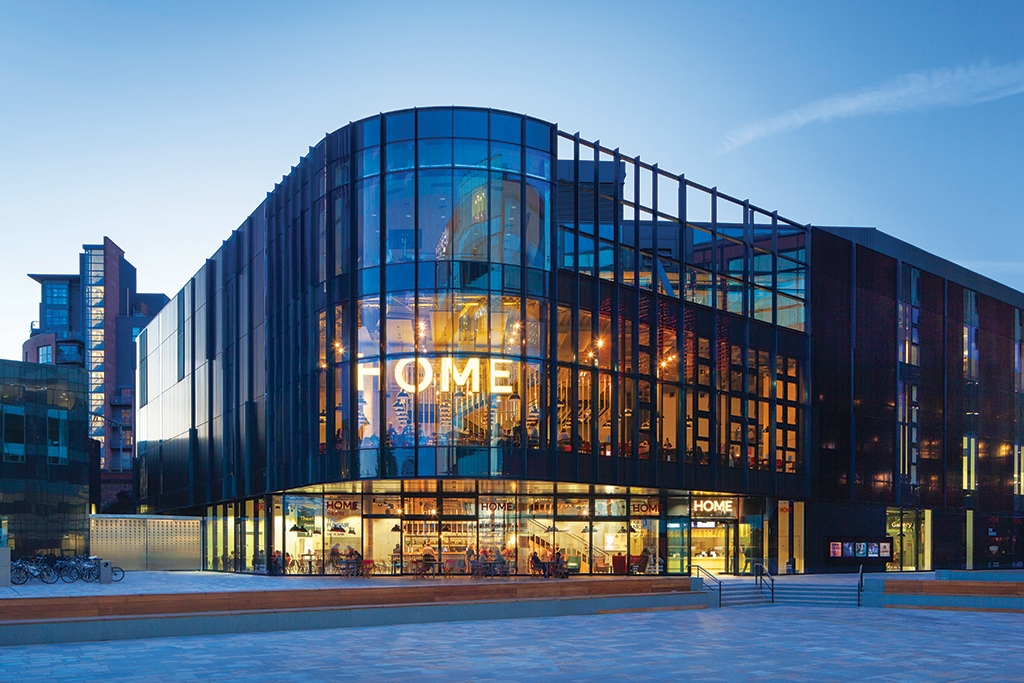

HOME. Credit: Paul Karalius
For more traditional British dining, brought up-to-date with fresh organic meat and produce, craft cocktails, and good lighting, try the Sunday roasts at Evelyn’s Café Bar (www.evelynscafebar.com) on boutique-lined Tib Street. In an airy room that feels more like Northern California than Old Blighty, you can tuck into mustard-rubbed beef with Yorkshire pudding, leg of lamb with pine nuts and rosemary, or a delicious newfangled root veg and goat cheese roast.
You can also find Britain’s other national culinary tradition, curries, at mom-and-pop Indian restaurants throughout the city, where tight, undecorated dining rooms are more than compensated for by hefty combo plates for under $10.
It was at just such a hole in the wall, called This & That (www.thisandthat.cafe), that the group of gay men I was traveling with found ourselves in the midst of a boisterous crowd of local soccer fans fueling up for an afternoon at the nearby stadium.
“Are you off to the match?” a whiskered old Indian gent asked me as he ladled a steamy lentil stew onto my platter.
“No,” I said, settling down at a communal table by the register. “We’re here for Pride weekend.”
Rising to leave a half-hour later, I excused myself as I slid past a few of the soccer fans, decked out in team gear. As I squeezed by, one of them turned away from his chicken tikka.
“Enjoy Pride,” he said. “Go Manchester!” I replied.
For general Manchester tourism information, see www.visitmanchester.com, which includes a specific section for LGBT visitors.
[slideshow_deploy id=’8183′]


